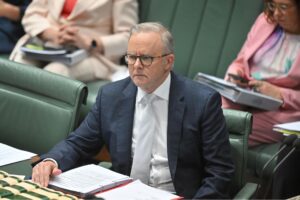Canberra is in the grip of Abundance fever, a virus that threatens to overwhelm public policy with a diagnosis of overregulation.
For those afflicted, the treatment is to maintain the status quo, but with the sheen of progressivism.
The Abundance agenda is being presented as a panacea for all of America’s problems, and therefore also Australia’s problems. It’s shaping next week’s productivity summit, as policy wonks, institutional heads, journalists and most government MPs hold up the Ezra Klein and Derek Thompson book as the new bible.
In America, the authors have been invited to speak at Democratic retreats as the answer to their woes, even as polling, the New York mayoral primary and the exasperated hair-pulling of millions of Americans say they’d much prefer Bernie Sanders’ socialism. But why change when you can do more of the same and call it abundance?
There are some thoughtful arguments in the book, but the crux of it boils down to “everything would be just fantastic and problem-free if we just cut the red tape that was holding back all that abundance we could be throwing around”.
Establishment Democrats love it because it sounds like a way of kick-starting a progressive agenda (Free healthcare! Jobs for all! Shorter work weeks! Affordable housing!) by doing nothing to challenge the existing economic status quo and just cutting more regulations. Just cut red tape and bada bing, bada boom – everything is fixed!
If it sounds too good to be true, that’s because it is.
That isn’t to say there’s not room to address Australia’s regulatory framework and the duplication across federal, state and local governments, because of course there is. And yes, of course, we should examine some of the NIMBY blocks to necessary progress and development, and how a certain class has learned to wield regulations against any and all growth.
But is it going to solve Australia’s (or indeed the world’s) problems? No. Of course not; one, because a lot of regulations are necessary (have you ever seen a royal commission not recommend more government oversight or not blame a lack of regulations for the terrible mess it’s examining?) and two, cutting red tape does nothing to address the very real environmental, inequality and standard of living crises we are facing.
They have not emerged because of regulations or a lack of “abundance”. If anything, it is because we live in an age of too much, and it’s choking us – and the planet – and now we are at the precipice where instead of turning to a people-first agenda, our leaders are convinced we just need to double down on “what’s good for the economy”.
But what is good for the economy is rarely good for people, who are at the heart of every economy, but are considered expendable by neo-liberal agendas. And it’s never good for the environment. If it was, then our leaders wouldn’t be turning themselves inside out trying to convince people it’s perfectly rational for big polluters to continue to pollute and for more fossil fuel mines to be opened, while the science tells us the exact opposite.
It’s not scarcity that has gotten us here. It’s the distribution of the resources, and the deliberate lack of focus on people. And cutting regulations is not going to do anything to help the vast majority address their falling standard of living, or arrest climate change.
Yet cutting regulations is the most likely immediate outcome of the upcoming productivity summit, with a best-selling book providing the cover to do a lot more of not solving our very real problems.
The book abandons focus on improving welfare, equality, healthcare, education and wealth distribution in favour of getting infrastructure built faster. Should we be building things quicker? Yes, of course. Is that going to address the major economic issues we are facing? Absolutely not. Does it do anything to reckon with the fossil fuel industry, land bankers, big tech or any of the other handbrakes on a more hopeful future that centres humanity and the planet? Pfffft – don’t be silly! We just need to build things faster and we’ll wake up in utopia!
Abundance fever allows leaders to pretend there is no other choice. That there is no need to grow public services or expand the role of government in housing, labour, education, welfare and health or take hold of corporate power and big tech’s incursions.
That it’s not a fairer tax system, or in Australia’s case, just a tax system that addresses the free ride the fossil fuel industry and other major multinational corporations receive to help pay for better public services for all of us, that will start making a difference. That there is no need to treat housing as a human right, or lift people out of poverty by increasing welfare, or abolish the demeaning job services system, or fund public education and health properly, or treat the care sector as the one of the most important underpinnings of a healthy society. Or even that we should be blaming neoliberals and the market for creating the mess we are in, and wrestling back that power to rebuild something better.
Instead, it leans in to the technocrats’ vision of a functioning society by claiming it’s too hard to build things, arguing we should stop making the billionaires who want to build all these things sad and just make it easier for them to do it.
There is another way, and it’s possible to find abundance in economic fairness.
But that would take our leaders getting their noses out of a book that gives them permission to continue doing the least while labelling it the most, and instead look through the eyes of those doing the most, and constantly receiving the least.
Between the Lines Newsletter
The biggest stories and the best analysis from the team at the Australia Institute, delivered to your inbox every fortnight.
You might also like
Does the government understand its own hate laws?
The government passed new gun control and hate speech legislation in a special parliamentary sitting, but what impact will they have on Australian democracy?
The cruel housing hoax
Amy Remeikis and Bill Browne discuss the federal election campaign so far, the performance of the media, and how preferential voting actually works.
What conservatives do better | Between the Lines
The Wrap with Amy Remeikis If there is one thing you can bank on, it is that conservative governments know how to use power. They never shy away from it. If a conservative government wants to change something, it will, and it won’t worry about who it is annoying, or the pushback, or whether or



